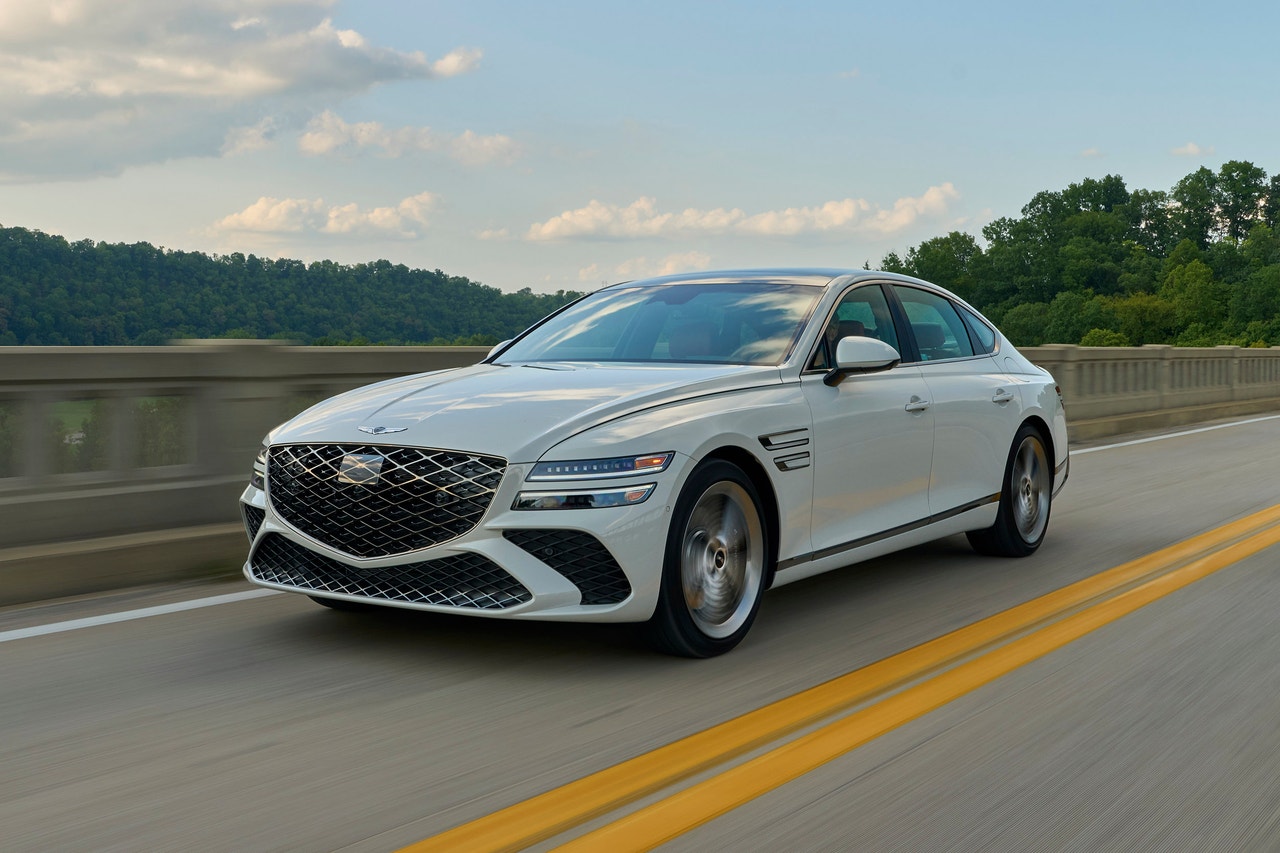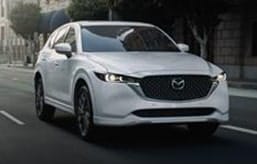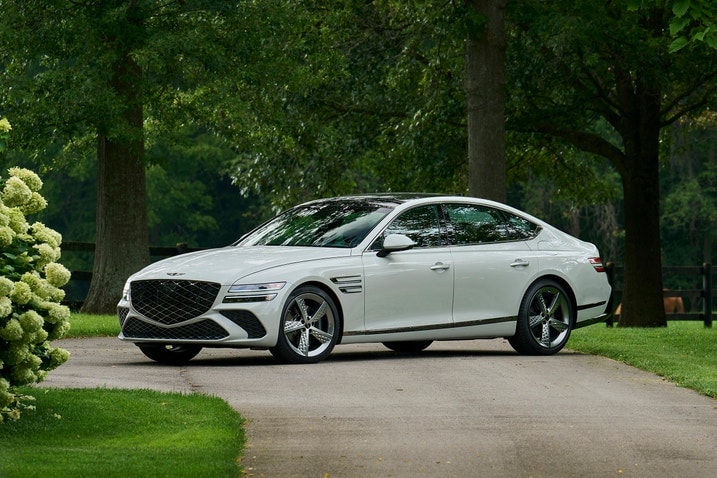- The midsize Genesis G80 luxury sedan gets some mild tweaks for 2025.
- Outside, you'll notice some styling tweaks, and inside, there's an ultra-wide display with revised infotainment tech.
- The G80 remains a great value; it's just as compelling as it ever was.
2025 Genesis G80 First Drive: Small Changes Strengthen This Sedan's Appeal
Genesis’ midsize luxury sedan still punches above its weight class, even if its refresh is more of a warm-over
The Genesis G80 has been around in its current form since 2020, so the company smartly decided to lavish a little care and attention on its middle-child luxury sedan. The results of this refresh aren't groundbreaking, yet they're enough to keep the G80 viable as a stylish and compelling option for buyers whose taste runs a little left of center.
Much like the sedan's overall styling, the G80's fundamentals remain largely the same. There are still two engine options: a 2.5-liter turbocharged four-cylinder with 300 horsepower and 311 lb-ft of torque as well as a 3.5-liter turbocharged V6 that makes 375 hp and 391 lb-ft. Both drivetrains are paired with an eight-speed automatic gearbox and all-wheel drive. The 2.5T is good for EPA fuel economy ratings of 24 mpg combined (20 city/29 highway), while the 3.5T reduces those numbers significantly to 19 mpg combined (16 city/24 highway).
Sporty is a strong word
While the Genesis' 3.5-liter V6 hasn't received any changes, it's still plenty robust thanks to its 391 pound-feet of peak torque, which is available between 1,300 and 4,500 rpm. The G80 3.5T Sport Prestige is never ponderous or slow, yet it never really lives up to that "Sport" name either, lacking the taut tactility you'll find in German competitors.
All G80s now get four-piston monobloc front brake calipers that were optional in prior years, though the brake rotor diameters differ between the four-cylinder and six-cylinder models. The 2.5T comes with a 13.6-inch front/12.8-inch rear setup as standard, with a 14.2-inch front/13.6-inch rear setup being optional. The 3.5T, meanwhile, gets the larger brakes across the board. In the 3.5T Sport Prestige, overall stopping power is good and the black calipers with white lettering certainly look cool. Also new is the ability to select between two brake feel settings. Normal provides a typical gentle pedal with easy modulation, while the Sport setting claims to provide quicker response. The difference is more subtle than I'd hoped, but neither setting is bad, so no points against.
The top-tier 3.5T AWD Sport Prestige gets a couple of unique benefits. These include four-wheel steering and a Sport Plus driving mode with launch control. The Sport Plus mode firms the car's adaptive suspension and increases the weight of the electronic steering rack appreciably. Launch control doesn't really seem useful in a luxury-minded car like the G80, and while it does provide a somewhat harder launch than simply pinning the go pedal to the floor, it's not so different that it merits the rigamarole of disabling the traction control and standing on both pedals. The Sport Prestige's electronic limited-slip rear differential is a nice feature, as well, helping to make the car feel decently nimble despite its 118.5-inch wheelbase and 4,619-pound curb weight.
Four-wheel steering for the win
While Genesis' four-wheel steering isn't the most natural-feeling system I've experienced, especially compared to something like what Porsche uses, it does wonders for the G80's slow-speed agility and high-speed stability. As with most rear-steer systems, the G80's rear wheels will steer in the opposite direction of the front wheels at low speeds and in the same direction as the fronts at higher speeds, virtually lengthening or shortening the car's wheelbase. It works well here, and I wish it was available on more than just the 3.5T Sport Prestige.
Don't make it weird
The G80's interior sees a number of changes, most notably the move to Genesis' 27-inch ultra-wide display for the instrument and infotainment screens. As in other models like the newly refreshed GV80 SUV, this screen is very responsive and generally very easy to read. The one exception is the vehicle's tachometer, which only shows a sort of progress wheel with numbers at the bottom. It's not strictly necessary to have a tach in a car like this, but if you're going to implement such a thing, don't make it weird. Genesis representatives assure me that there is a way to change the way engine speed is displayed, but it's buried so deep in submenus that any victory would have felt Pyrrhic by the time I figured it out.
The infotainment system housed within that new display gets a big overhaul. First and somewhat unfortunately, the awesome 21-speaker Lexicon audio system is gone, but the good news is that the 18-speaker Bang & Olufsen system that replaces it is still a banger. One unique feature is a Beosound app in the menu that lets the user drag a dot around a circle to choose between four different sound profiles or blends thereof. It's simple to use and easily lets you find your desired audio settings.
Apple CarPlay and Android Auto now connect wirelessly, which is a plus, and the Qi charging pad has been moved from the front of the center console to the rear by the armrest as part of a general ergonomic reorganization. Genesis engineers left plenty of physical controls for things like volume, audio tuning and cabin temperature, and the rest of the buttons have haptic feedback making them easy to use as well.
Still a sweetheart
Overall, Genesis managed to do something simple that's actually pretty hard: Make a car better without making anything worse. The G80 is still as good as it ever was, and as long as you're willing to pony up the $78,250 (including a $1,250 destination fee) for the top-of-the-line 3.5T AWD Sport Prestige version, it's actually a decent performer, what with that electronic limited-slip diff and rear-axle steering system. Thankfully, if you can live without those features, the G80 still represents a good value at any trim level, with the base 2.5T model coming in well equipped at $58,350.
The Genesis G80 continues to blaze its own trail, showing the world what Korean luxury means while it shames the much more conservative design departments of its rivals from Japan and Europe. It also offers considerable value for your luxury dollar with an impressive list of standard equipment even at the base level. If you're looking for your first luxury car or perhaps something a little easier on the wallet than a more traditional German, the G80 remains an excellent choice.








_175.jpg) by
by  edited by
edited by